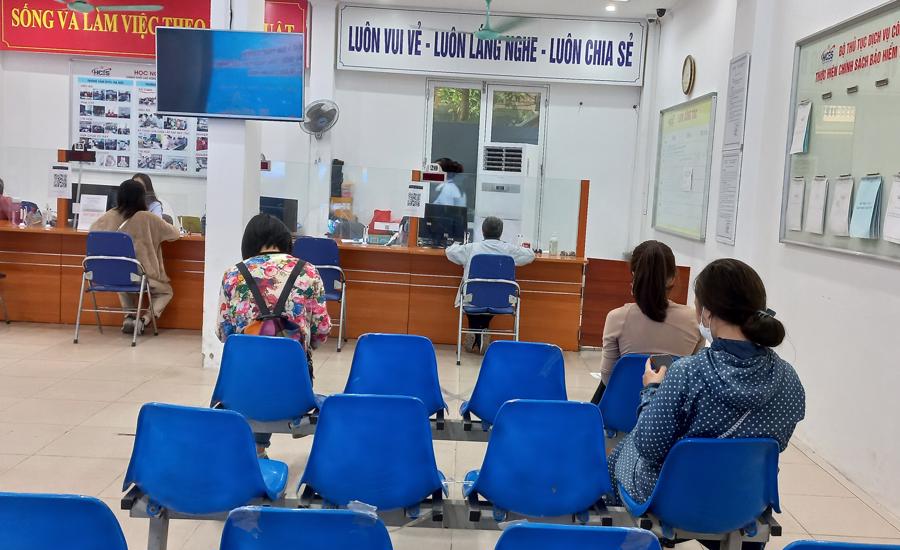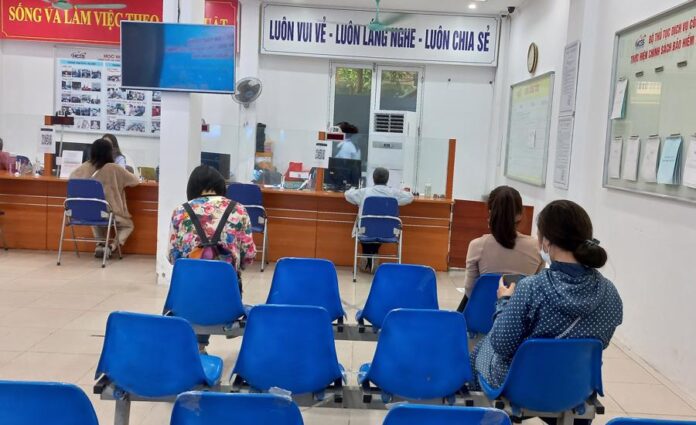The draft Labor Law (amended) submitted to the National Assembly has proposed regulations regarding the salary basis for unemployment insurance contributions by employees.
DISTINGUISHING BETWEEN SALARY BASES FOR PUBLIC AND PRIVATE SECTORS
Accordingly, for employees subject to the salary scheme determined by the State, the salary basis for unemployment insurance contributions includes the monthly salary based on positions, titles, ranks, and grade levels, along with position allowances, seniority allowances exceeding the framework, occupational seniority allowances, and salary retention coefficients (if any).
For employees subject to the salary scheme determined by the employer, the salary basis for unemployment insurance contributions comprises the monthly salary, encompassing the salary based on jobs or positions, salary allowances, and other agreed-upon regular and stable supplementary payments in each salary payment period.
In cases where employees stop working but still receive a monthly salary equal to or higher than the minimum salary basis for compulsory social insurance contributions, contributions shall be based on the salary received during the work stoppage period.
The highest salary basis for unemployment insurance contributions is 20 times the regional minimum wage announced by the Government at the time of contribution payment.
Currently, the regional minimum wage is stipulated in Government Decree No. 74/2024, corresponding to VND 4.96 million per month for Region I, VND 4.41 million for Region II, VND 3.86 million for Region III, and VND 3.45 million for Region IV.
According to the Law draft, employees participating in unemployment insurance who are temporarily detained or have their work suspended shall temporarily stop making unemployment insurance contributions along with their employers.
If the employee is entitled to back pay, both the employee and the employer shall make up for the unpaid contributions for the months of detention or work suspension, concurrently with the back payment of compulsory social insurance contributions.
The collection of unpaid unemployment insurance contributions shall be carried out simultaneously with the collection of unpaid compulsory social insurance contributions as per the Law on Social Insurance.
UNIFYING CONTRIBUTION AND BENEFIT CEILINGS
Regarding the issue of the salary basis for unemployment insurance contributions, the Standing Committee of the National Assembly, in its report on the absorption, explanation, and revision of the Labor Law (amended) draft, stated that there were suggestions to unify the salary basis for unemployment insurance contributions (20 times the regional minimum wage) and the salary basis for compulsory social insurance contributions (20 times the reference salary).

On this matter, the Standing Committee of the National Assembly clarified that the current legal provisions already differentiate between unemployment insurance participants in the state and non-state sectors.
For employees subject to the salary scheme determined by the State, the maximum salary basis is 20 times the basic salary, and the maximum benefit is 5 times the basic salary.
For employees contributing to unemployment insurance under the salary scheme determined by the employer, the maximum salary basis is 20 times the regional minimum wage, and the maximum benefit is 5 times the regional minimum wage.
The Standing Committee of the National Assembly emphasized that unemployment insurance is a short-term policy with a high risk-sharing nature, following the principle of the majority subsidizing the minority. The provision of unemployment allowances aims to partially support employees’ income during temporary unemployment and is limited to a specific period.
Subsequently, other tools such as counseling, job referrals, and vocational training support are employed to encourage employees to swiftly seek new employment, rather than relying on long-term social insurance accumulation after leaving the labor market.
Therefore, the Standing Committee of the National Assembly asserted the necessity of unifying the contribution and benefit ceilings for unemployment insurance across the state and non-state sectors, aligning with the short-term nature of unemployment insurance. Specifically, the contribution ceiling should be 20 times, and the benefit ceiling should be 5 times the regional minimum wage.
Moreover, unifying the contribution ceiling for unemployment insurance (20 times the regional minimum wage) does not contradict the contribution ceiling for compulsory social insurance (20 times the reference salary) stipulated in the Law on Social Insurance. These are two distinct policies.
The Standing Committee of the National Assembly underscored that the differentiation in contribution ceilings for social insurance and unemployment insurance is not novel but is already implemented under the current Law on Social Insurance and Labor Law.
Concurrently, it does not impede the operations of agencies, organizations, and enterprises during the transition to enhanced digitalization.
The Ministry of Home Affairs Proposes Provincial People’s Committees to Decide on Regional Minimum Wages
The Provincial People’s Committee shall take into account the socio-economic conditions of each commune and ward to select and decide on the application of specific regional minimum wage levels for these areas.
The Power of Persuasive Writing: “Proposed Salary-Based Mandatory Social Insurance Contributions”
The Ministry of Labour, Invalids and Social Affairs is seeking feedback on a draft decree detailing and guiding the implementation of several articles of the Law on Social Insurance regarding compulsory social insurance, including provisions on salary levels for compulsory social insurance contributions.





















